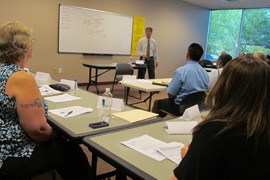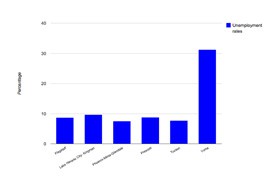Cronkite News has moved to a new home at cronkitenews.azpbs.org. Use this site to search archives from 2011 to May 2015. You can search the new site for current stories.
Experts: Prolonged unemployment putting strain on mental health
PHOENIX – Psychiatrist Dr. Daniel Merrill is seeing it more and more in the tough economy:
Someone ends up in the hospital suffering from depression or anxiety brought on by the stress of unemployment. Sometimes the condition leads to a substance-abuse problem or suicide attempt.
At the same time, Merrill said, people facing such problems have less access to mental and behavioral health services due to state cuts and to help from nonprofits that rely on donations.
“It’s kind of a double whammy,” said Merrill, Mercy Gilbert Medical Center’s medical director in the department of psychiatry. “Not only are we having an increase in need for mental health services, but resources are being curtailed.”
Merrill and other health professionals say stress-related problems have become increasingly common as widespread unemployment has taken a toll on mental health.
Unemployed people are twice as likely to experience psychological problems including depression, anxiety, psychosomatic symptoms and poor self-esteem, according to a report by the American Psychological Association.
Stress from unemployment also can contribute to physical problems such as elevated heart rate and high blood pressure, said Dr. Janie Goodall, a psychologist with Banner Psychological Services.
“That’s just in the short term,” she said.
Prolonged stress, such as that caused by long-term unemployment, can be even worse, contributing to cardiovascular, gastrointestinal, respiratory and immune function problems, sleep disorders and chronic pain, Goodall said.
Arizona’s unemployment rate was 8.3 percent in August, according to the U.S. Bureau of Labor Statistics.
Stress and mental health problems resulting from unemployment can increase demand for services, according to Dr. Babak Nayeri, an executive consultant for the Arizona Department of Health Services.
“It does affect the society at large,” Nayeri said. “Any time we have an individual or individuals whose health and well-being is suffering, that adds a burden on our health system.”
High unemployment also means a reduced tax base, which leads to depleted resources. Goodall said cuts to Medicaid, mental health services and behavioral health services, along with less funding for nonprofit, community-based services have stretched the safety net to its breaking point.
“You have the perfect storm right now with the national and state economic problems,” she said.
But there are still resources available for those in need, including community health centers, county behavioral health services and programs offered through the Arizona Department of Health Services. Clinics that charge on a sliding scale based on income, community health centers and training programs for medical professionals are options for low-cost care.
County and state workforce-development programs can also provide job seekers an outlet to channel their stress into focusing on the job search process.
Justin Jones, a training and assessment supervisor for Maricopa Workforce Connections, said the organization focuses on teaching job seekers how to overcome fear of the job search.
“Obviously stress is going to be a part of every job search, but in this economy it seems to be doubled or tripled for people,” Jones said.
Moriah Blomfield, a business services representative at Arizona Department of Economic Security, said there are ways for job seekers to reduce stress.
“It’s really important for the person who is unemployed to take good care of themselves and get sleep, eat right and exercise, to take time to themselves and to set daily goals as well as job search goals for themselves,” she said.
After losing her job of six years as a fraud analyst with Bank of America, Cesiley Hudson had to deal with the stress of supporting her family, meeting her mortgage and keeping up with bill collectors.
“I’m always nervous, always nervous every day about the uncertainty,” Hudson said.
Instead of dwelling on the stress, Hudson said she channeled her energy into developing her small business, a catering company called Cesnik’s Flavors. It turned out, for Hudson, that losing her job allowed her the opportunity to focus on her dream.
“I see it as a blessing, if you could ever say being unemployed is a blessing,” she said. “It pushed me to do something that I might never have done if I had a job.”








